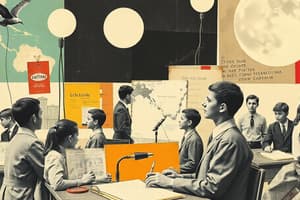Podcast
Questions and Answers
What do traditional points of view of the curriculum emphasize according to Robert M. Hutchins?
What do traditional points of view of the curriculum emphasize according to Robert M. Hutchins?
- Hands-on learning experiences
- Elective courses
- Extracurricular activities
- Permanent studies in grammar, reading, and mathematics (correct)
According to Goodland & Su (1992), what does a curriculum aim to achieve?
According to Goodland & Su (1992), what does a curriculum aim to achieve?
- Fragmentation in learning experiences
- Behavior changes in students through planned activities (correct)
- No guidance from the school
- Confusion among students
What questions are posed by Cronbeth (1992) regarding the curriculum?
What questions are posed by Cronbeth (1992) regarding the curriculum?
- Why do students require breaks during learning?
- When are students most productive?
- What knowledge, skills, and values are most worthwhile? (correct)
- How should schools be designed?
How do diverse points of view describe the curriculum?
How do diverse points of view describe the curriculum?
What is the impact of one's point of view on the concept and meaning of curriculum according to the text?
What is the impact of one's point of view on the concept and meaning of curriculum according to the text?
Which individuals are associated with advancing traditional points of view about the curriculum?
Which individuals are associated with advancing traditional points of view about the curriculum?
Which of the following is NOT one of the three ways of approaching a curriculum according to the text?
Which of the following is NOT one of the three ways of approaching a curriculum according to the text?
What does the text state as an example of curriculum approached as content or a body of knowledge in primary school?
What does the text state as an example of curriculum approached as content or a body of knowledge in primary school?
Which of the following is an example of curriculum approached as a product or learning outcomes?
Which of the following is an example of curriculum approached as a product or learning outcomes?
Which of the following is NOT one of the ways the text states curriculum can be approached or defined?
Which of the following is NOT one of the ways the text states curriculum can be approached or defined?
What does the text state as an example of curriculum approached as content or a body of knowledge in secondary school?
What does the text state as an example of curriculum approached as content or a body of knowledge in secondary school?
Which of the three approaches to curriculum is described as 'what happens when the curriculum is practiced'?
Which of the three approaches to curriculum is described as 'what happens when the curriculum is practiced'?
Which of the following best describes the nature of the curriculum according to Daniel Tanner's definition?
Which of the following best describes the nature of the curriculum according to Daniel Tanner's definition?
According to Pratt's definition, what is a key characteristic of the curriculum?
According to Pratt's definition, what is a key characteristic of the curriculum?
Which of the following is not included in Schubert's definition of the curriculum?
Which of the following is not included in Schubert's definition of the curriculum?
According to Hass's definition, which of the following is a key component of the curriculum?
According to Hass's definition, which of the following is a key component of the curriculum?
Which of the following best captures the essence of Grundy's definition of the curriculum?
Which of the following best captures the essence of Grundy's definition of the curriculum?
Which of the following definitions emphasizes the curriculum as a means of reforming society?
Which of the following definitions emphasizes the curriculum as a means of reforming society?
Flashcards are hidden until you start studying
Study Notes
Definition of Curriculum
- A plan that consists of learning opportunities for a specific time frame and place, aiming to bring about behavior changes in students as a result of planned activities.
- Includes all learning experiences received by students with the school's guidance (Goodland & Su, 1992).
Approaches to Curriculum
- Can be approached as content, process, or outcome.
- Content: a body of knowledge to be transmitted, e.g. mathematics curriculum consisting of addition, multiplication, etc.
- Process: what happens when the curriculum is practiced.
- Outcome: the learning outcomes desired by learners.
Different Definitions of Curriculum
- A planned and guided set of learning experiences and intended outcomes (Daniel Tanner, 1980).
- A written document describing goals, objectives, content, learning activities, and evaluation procedures (Pratt, 1980).
- The contents of a subject, concepts, tasks to be acquired, planned activities, and desired learning outcomes (Schubert, 1987).
- All experiences in a program of education aiming to achieve broad goals and related specific objectives (Hass, 1987).
- A program of activities designed to attain possible educational objectives (Grundy, 1987).
Points of View on Curriculum
- Traditional: emphasizes permanent studies, such as grammar, reading, rhetoric, logic, and mathematics (Robert Hutchins).
- Progressive: diverse points of view, dynamic and ever-changing.
Questions to Define Curriculum
- What knowledge, skills, and values are most worthwhile?
- Why are they most worthwhile?
- How should the young acquire them? (Cronbeth, 1992)
Studying That Suits You
Use AI to generate personalized quizzes and flashcards to suit your learning preferences.


